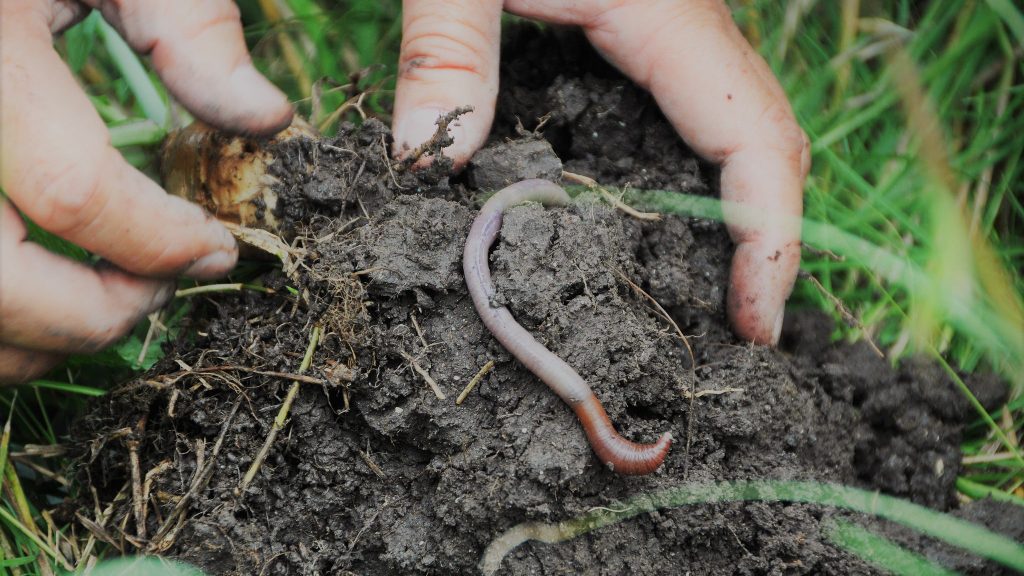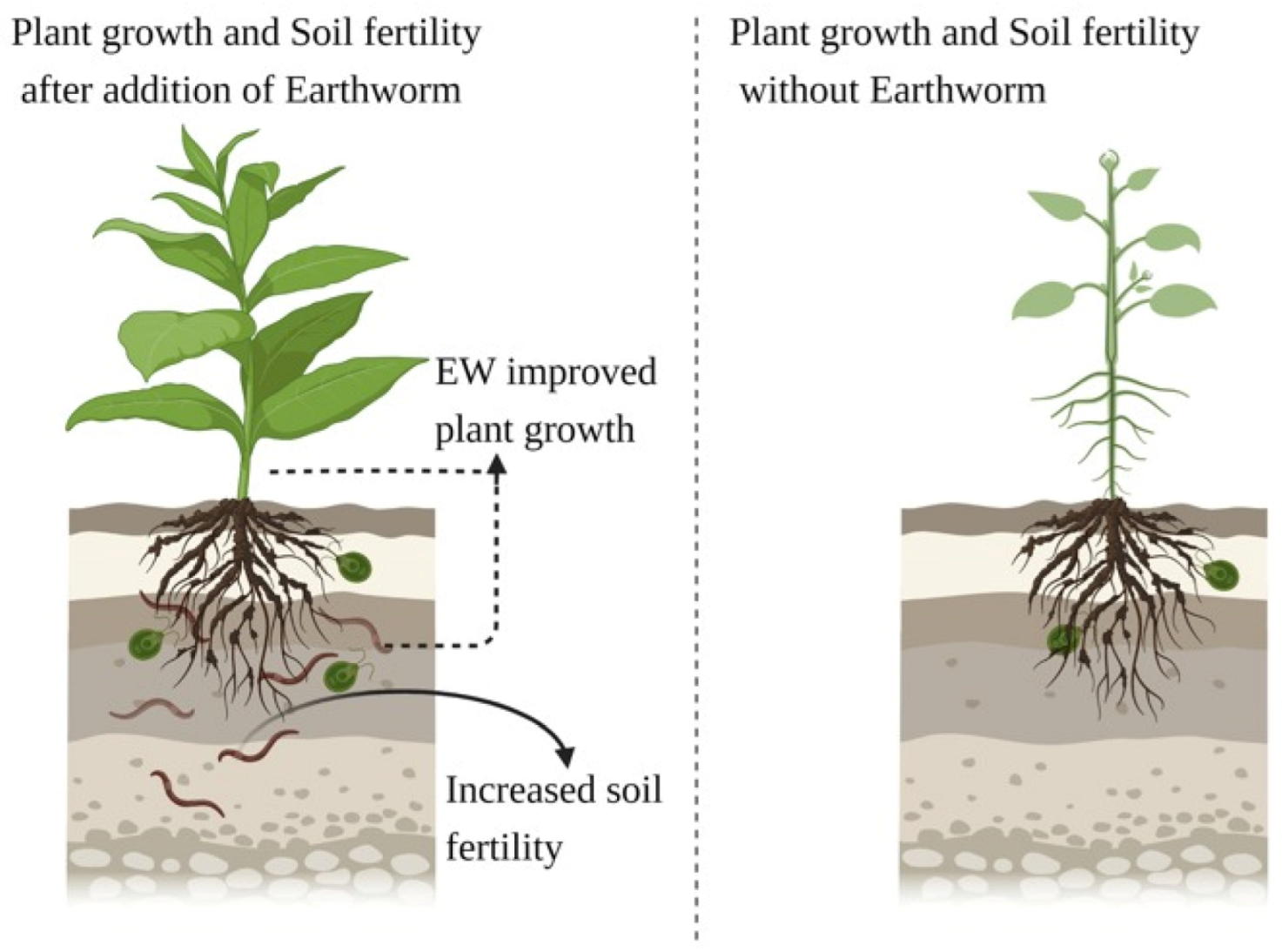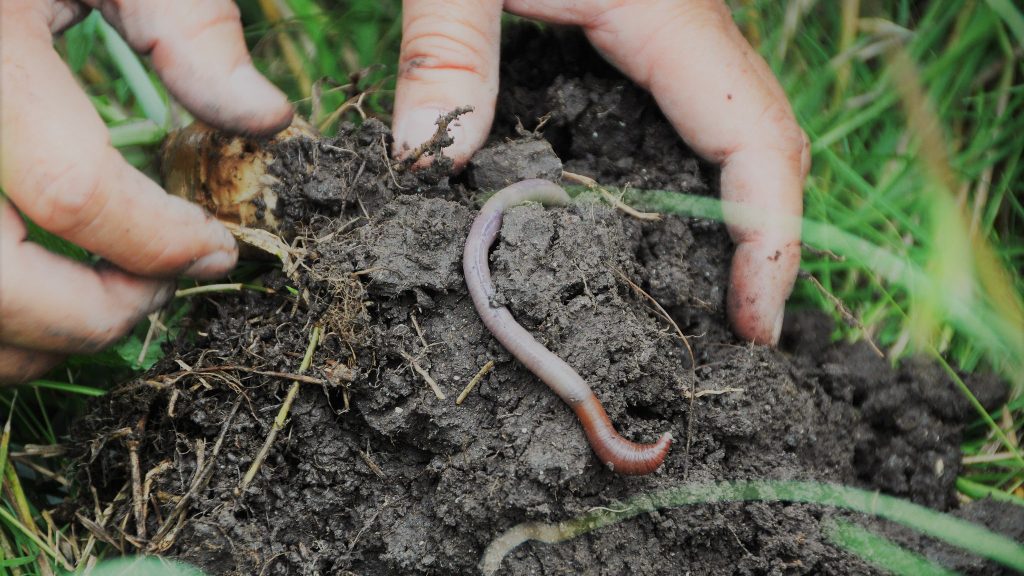Imagine boosting your garden or farm’s productivity naturally, without the need for chemicals. You might be surprised to learn that the secret lies right beneath your feet.
Earthworms, often overlooked, play a crucial role in sustainable soil management. These small, wriggling creatures are nature’s very own soil engineers, tirelessly working to improve soil health. Have you ever wondered how you can make your soil more fertile, improve water retention, and promote plant growth without spending a fortune?
Earthworms might just be the answer you’ve been looking for. They help break down organic matter, enhance nutrient availability, and improve soil structure. By understanding how earthworms work, you can harness their power to create a thriving ecosystem in your garden or farm. As you continue reading, you will discover how these humble creatures contribute to sustainable agriculture and how you can encourage their presence in your soil. Get ready to unlock the secrets of earthworms and transform your soil management practices for the better.
Earthworms And Soil Health
Imagine a world where tiny creatures silently work to improve your garden’s health without you lifting a finger. That’s the magic of earthworms! These humble beings play a crucial role in enhancing soil health, making them invaluable to sustainable soil management.
Think back to a time when you dug into the soil and found a wriggling earthworm. Did you pause to wonder how it contributes to the earth beneath your feet?
Here’s how these little marvels help keep your soil healthy and thriving:
Nutrient Cycling
Earthworms are nature’s recyclers. As they move through the soil, they consume organic matter and break it down. This process releases nutrients like nitrogen and phosphorus, vital for plant growth.
Imagine having natural fertilizers right in your garden. Earthworms help distribute these nutrients evenly throughout the soil, ensuring that your plants receive what they need to flourish.
Isn’t it fascinating how such a small creature can have such a big impact on nutrient distribution?
Soil Aeration
Have you ever noticed how easy it is to dig into soil filled with earthworms? Their movement through the soil creates tiny channels, improving soil aeration.
This aeration allows roots to access oxygen more efficiently, promoting healthier plant growth. It also aids in water drainage, preventing waterlogged conditions that can damage plants.
Think of earthworms as tiny tillers working tirelessly to keep your soil breathable and well-drained. Isn’t that a comforting thought?
Organic Matter Decomposition
Earthworms excel at breaking down dead plant material. As they consume organic matter, they convert it into simpler compounds, making it easier for plants to absorb nutrients.
This decomposition process not only enriches the soil but also helps in reducing waste. Your garden becomes a cleaner, healthier environment with the help of these diligent decomposers.
Have you considered how earthworms can help reduce your garden waste naturally?
By appreciating earthworms, you embrace a more sustainable approach to soil management. These small creatures offer practical benefits that can transform your gardening experience.
Next time you spot an earthworm, give it a nod of gratitude. It’s working hard to ensure your soil remains healthy and productive.

Enhancing Soil Fertility
Earthworms boost soil health by breaking down organic matter into nutrients. They create channels that improve water flow and air in the soil. Their activity supports sustainable soil management by enhancing soil structure and fertility.
Enhancing soil fertility is crucial for sustainable soil management, and earthworms play a significant role in this process. These humble creatures are often referred to as “nature’s plow” for a good reason. By burrowing through the soil, they create channels that allow air and nutrients to reach plant roots more effectively. But their contribution doesn’t stop there; earthworms also improve the soil’s ability to retain water and support beneficial microbial life. Let’s dive deeper into how earthworms enhance soil fertility.Improving Soil Structure
Earthworms are natural engineers. As they tunnel through the ground, they break up compacted soil, improving its structure. This makes it easier for roots to grow and access the nutrients they need. You might have noticed how loose and crumbly the soil feels in a garden bed teeming with earthworms. This improved soil structure also helps prevent erosion by stabilizing the ground. Think about the last time you planted in compacted soil; it probably felt like trying to dig through a brick. Earthworms help alleviate this frustration, making your gardening efforts more rewarding.Increasing Water Retention
Have you ever wondered why some soils dry out faster than others? Earthworms can be your allies in solving this problem. Their tunneling activity increases the soil’s ability to hold water, reducing the need for frequent watering. This is particularly beneficial during dry spells when water conservation is critical. By creating pathways for water to penetrate deeply into the soil, earthworms ensure that moisture reaches the roots where it’s needed most. Next time you dig into your garden and find the soil retaining moisture even after a sunny day, you might want to thank your earthworm friends.Boosting Microbial Activity
The presence of earthworms in the soil has a ripple effect on microbial life. As they consume organic matter, earthworms produce nutrient-rich castings that serve as a natural fertilizer. These castings provide an ideal environment for beneficial microbes to thrive. Microbes play a vital role in breaking down organic material into nutrients that plants can easily absorb. Imagine a bustling underground city where microbes and earthworms work together to create a fertile environment. This partnership not only boosts plant growth but also enhances the soil’s resilience to diseases and pests. As you consider sustainable practices for your garden or farm, think about the unseen army of earthworms beneath your feet. Are you doing enough to encourage their presence? By supporting earthworm activity, you’re investing in a healthier, more fertile soil that can sustain crops for generations to come.Earthworms In Agroecosystems
Earthworms enrich soil health by enhancing nutrient recycling and improving soil structure. Their burrowing action boosts water infiltration, aiding sustainable agriculture. These creatures play a vital role in maintaining fertile agroecosystems.
### Earthworms in Agroecosystems Earthworms play an essential role in agroecosystems, making them invaluable allies for sustainable soil management. They improve soil structure, enhance nutrient cycling, and increase water infiltration. By supporting these natural processes, earthworms contribute significantly to the health of agricultural lands. ###Role In Crop Production
Earthworms boost crop production by improving soil fertility. They break down organic matter, releasing nutrients readily available for plants. This natural fertilization reduces the need for chemical fertilizers, promoting healthier crops and more abundant yields. Their burrowing activities create channels in the soil. These channels improve root growth and allow plants to access deep water and nutrients. As a result, crops can withstand drought conditions better, ensuring more consistent harvests. ###Benefits For Farmers
Farmers gain numerous advantages by harnessing the power of earthworms. With earthworms improving soil health, farmers often see increased crop yields without additional input costs. This can lead to greater profitability and sustainability for farming operations. Earthworms also help in reducing soil erosion. Their burrowing stabilizes the soil, preventing it from being washed away during heavy rains. This not only preserves the topsoil but also reduces the risk of water pollution from runoff. ###Integration With Other Practices
Combining earthworm activity with other sustainable practices can amplify their benefits. Practices like crop rotation, cover cropping, and reduced tillage work harmoniously with earthworms. These methods help maintain a balanced ecosystem, enhancing the overall productivity of the land. Consider adding organic matter like compost or mulch to your fields. This provides a food source for earthworms, encouraging their population growth. A thriving earthworm community, combined with other sustainable practices, creates a resilient agroecosystem. Have you observed the changes earthworms bring to your soil? If not, it might be time to take a closer look. Integrating them into your soil management strategy could transform your farming experience.
Conservation And Management
Earthworms play a vital role in sustainable soil management. They enhance soil structure and fertility by breaking down organic matter. Their movement aerates the soil, promoting root growth and water absorption.
Conservation and management of earthworms in soil is crucial for sustainable agriculture. These unsung heroes of the soil contribute significantly to soil health and fertility. By protecting their habitats and promoting their presence, we can enhance soil productivity and sustainability.Protecting Earthworm Habitats
Protecting earthworm habitats is essential for their survival and activity. Avoid using harmful chemicals that can damage their living environment. Instead, opt for natural composting methods to enrich the soil without harming these beneficial creatures. Consider creating buffer zones in your garden or farm. These areas can act as safe havens for earthworms, encouraging their proliferation. Mulching is another effective way to maintain moisture in the soil, creating a favorable habitat for earthworms.Sustainable Farming Techniques
Adopting sustainable farming techniques can support earthworm populations. Practices like crop rotation and reduced tillage help maintain soil structure. They also minimize disturbance to the earthworms’ environment, allowing them to thrive. Use organic fertilizers to avoid the adverse effects of chemical ones. Organic matter from compost or green manure provides food for earthworms, enhancing their activity. This, in turn, improves soil aeration and nutrient cycling, which are vital for plant growth.Promoting Biodiversity
Promoting biodiversity in your garden or farm can boost earthworm populations. Diverse plant species provide varied organic matter, which earthworms feed on. This diversity also encourages a balanced ecosystem, supporting different beneficial soil organisms. Encourage natural predators that keep harmful pests in check without affecting earthworms. Birds, for example, can control pest populations while earthworms continue to improve soil health. By fostering a diverse ecosystem, you create a resilient soil environment. How can you start today to protect these vital creatures in your soil? Simple actions like reducing chemical use and enhancing biodiversity can have a big impact. Your efforts in conservation and management of earthworms will not only benefit the soil but also contribute to sustainable food production.
Conclusion
Earthworms play a vital role in sustainable soil management. Their movement aerates the soil, improving water absorption. This helps plants grow stronger. Earthworm waste enriches soil nutrients, promoting healthy crops. Farmers benefit from less need for chemical fertilizers. Earthworms also control pests naturally, reducing damage.
Healthy soil means better yields and lower costs. Encouraging earthworm activity supports long-term soil health. It’s a simple way to boost farm productivity. Understanding their impact can lead to more eco-friendly farming practices. Embrace earthworms in soil care, and see the positive changes.
Sustainable farming starts with the smallest creatures.



